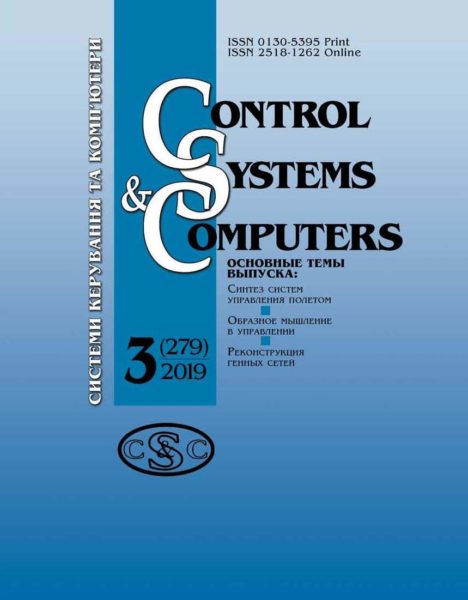Control Systems and Computers, N1, 2018, Article 1
DOI: https://doi.org/10.15407/usim.2018.01.003
Upr. sist. maš., 2018, Issue 1 (273), pp. 3-15.
UDC 303.721;004.03142
Grіtsenko Volodymyr I.,Corresponding member of the Ukrainian academy of sciences, Director, E-mail: vig@irtc.org.ua
Manako Аlla F., Doctor of Technical Sciences, head of the department, E-mail: alla@irtc.org.ua
Synytsya Kateryna M., PhD in Technical Sciences, Deputy Director on Research, E-mail: ksynytsya@irtc.org.ua
International Research and Training Center for Information Technologies and Systems of the NAS and MES of Ukraine, Glushkov ave., 40, Kyiv, 03187, Ukraine
E-Transformation in Learning
Introduction. The current problem of electronic transformation is examined. The particular attention is paid to the initial phase of the period of e-transformations that arose in learning under the influence of the information society and information and communication technologies development. The questions of the pedagogical influence on the processes of e-transformations are considered. Some general changes are determined, which are the most particular for the modern understanding of the level of using the perspective information and communication technologies.
Purpose. A brief description of the e-transformations in learning is given.
Methods. The requirements, recommendations and conclusions are made based on the literature study, system analysis methods and generalizations.
Results. The main e-transformations are described. The most significant of the e-transformations in learning are considered.
Conclusion. E-transformations, which are essentially for the first phase of the ongoing transformations that arose under the influence of the scientific and technological revolution and promising ICTs, give rise to a new vision of the learning paradigm itself and the technological capabilities of supporting all processes supporting learning. All this, at a whole, provides the opportunities for further enhancement of the technology support of truly high-quality mass-continuous education for all, including new opportunities for supporting the alternative learning at any time and anywhere.
Keywords: e-learning, e-transformation, information technologies in learning, new educational paradigms.
Download full text! (In Russian)
- GRITSENKO, V.I., 2007. Information and communication technologies in education for all – in the light of the problems of the knowledge society, Kyiv: Academiperiodica, 28 p. (In Russian).
- GRITSENKO, V.I., 2005. “Perspective learning technologies are the foundation of the strategy for building a knowledge society”, Upr. sist. mas., 6, pp. 5-10. (In Russian).
- GRITSENKO, V.I., 2008. Fundamental Problems of E-Learning, K.: Academiperiodica, 38 p. (In Russian).
- OGURTSOV, A.N., 2008. Basics of the scientific research. Kharkiv: NTU “KhPI”, 178 p. (In Ukrainian).
- BAUMAN, Z., 2004. Consequences for man and society, Moskow: The Whole World, p. 72. (In Russian).
- MANAKO, A.F., SINITSA, E.M., 2012. “CT in training: a view through the prism of transformations”. Educational technologies and society, 15 (3), pp. 392-414, http://ifets.ieee.org/russian/periodical/ V_153_2012EE.html. (In Russian).
- MANAKO, AF, SINITSA, E.M., 2014. Information Society and ICT in Education, Lambert Academic Publ. ISBN 978-3-659-59949-1, 199 p. (In Russian).
- YAREMENKO, V., SLIPUSHKO, O., 2001. A New Explanatory Dictionary of the Ukrainian Language: In 4-t .: T 4, Kyiv: Akonit, 944 p. (In Ukrainian).
- MIRSKAYA E.Z., 2000. New communication technologies and prospects for the transformation of science. Naukovedenie, 1, pp. 212-215. (In Russian).
- The ICT Competence Framework for Teachers: UNESCO Recommendations, 2011, 116 p. http: //iite.unesco. org / pics / publications / en / files / 3214694.pdf. (In Russian).
- STEPIKO, M.T., 2011. Ukrainian identity: the phenomenon and principles of formation, Kiev: NISS, 336 p. (In Ukrainian).
- MAKSIMENKO, V.P., 2013. Didactics: Teaching Manual, Khmelnytsky: KhMTSNP, 222 p. (In Ukrainian).
- CHOSHANOV, M.A., 2013. “E-didactics: A new look at the theory of learning in the digital age”. Educational technologies and society (Educational Technology & Society), 16 (3), pp. 684-696. (In Russian).
- BERSIN, J., 2012. The Disruption of Digital Learning: Ten Things We Have Learned [online]. Available at: < https://www.linkedin.com/pulse/disruption-digital-learning-ten-things-we-have-learned-josh-bersin> [Accessed 28 Dec. 2017].
- HUG, T., LINDNER, M., BRUCK, P.A., 2006. Microlearning: Emerging Concepts: Practices and Technologies after e-Learning, Innsbruck Univ. Press, 230 p.
- DRUCKER, P., 1993. Innovation and entrepreneurship. Practice and principles. Collins, 293 p.
- XU, S., LI, S., 2008. “The SCORM standard and its application in Web-based education resources building”. IT in Medicine and Education, ITME 2008. IEEE Int. Symp., pp. 212–215.
- MURRAY, K., BERKING, P., HAAG, J. et al., 2012. “Mobile Learning and ADL’s Experience API”. Connections: The Quarterly J., 12, n 1, pp.45–55.
- LINDERT, L., SU, B., 2016. “The Evolution of SCORM to Tin Can API: Implications for Instructional Design”. Educational Technology, 56 (4), pp.44–46.
- BERKING, P., 2015. Choosing a learning record store (LRS), Nov. 2015 [online]. Available at: < http://adlnet.gov/adl-assets/uploads/2015/11/ Choosing-an-LRS.pdf> [Accessed 25 Oct. 2017].
- BAKE R.S., INVENTADO P.S., 2014. “Educational data mining and learning analytics”. Learning analytics, New York: Springer, pp. 61–75.
- MANAKO, A.F., 2012. “Approach to the construction of a formalized description of information systems for education and training”. Educational technologies and society, 15 (3), pp. 536–547, http://ifets.ieee.org/russian/depository/v16_i1/ html/10.htm.
- MANAKO, A.F., SYNYTSA, K.M., 2017. “Information Technologies in Education”, Upr. sist. maš., 2, P. 46-58. (In Russian).
- DOVGYALLO, A.M., KOLOS, V.V., KUDRYAVTSEVA, S.P. et al., 1999. “Experience of distance learning on the basis of telecommunication technologies in Ukraine”, Upr. sist. maš., 5, pp. 84-91. (In Russian).
- VEROVKO, M.V., 2015. “Information technology for monitoring distance learning according to the data of network traffic”, Ph.D. Thesis, Chernihiv, p. 149, http: // stu.cn.ua/media/files/pdf/dis/diser_verm.pdf. (In Ukrainian).
- VOYCHENKO, O., SYNYTSYA, K., MANAKO, A., 2011. “Web 2.0 based LMS extension for life long learning support”. eLearning and Software for Education. 7 Int. Conf. ELSE, 2011, 1, pp.149–154.
Received 12.01.2018



